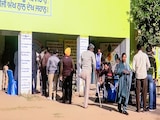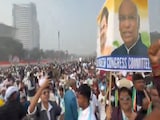The Congress party seems to have successfully exacted revenge on the six Himachal MLAs who cross-voted and helped the Bharatiya Janata Party (BJP) candidate, Harsh Mahajan, win the Rajya Sabha elections held recently. Assembly Speaker Kuldeep Singh Pathania, who disqualified the rebel MLAs, has left them with the option of appealing in courts or contesting by-polls. Additionally, with party leader Vikramaditya Singh - son of the late Himachal Pradesh Chief Minister Virbhadra Singh - changing his mind after discussions and deciding not to resign for now, it looks like the Congress high command with its damage control measures has managed to ensure that the government survives for the time being and doubts about its continuity subside.
With these disqualifications, the strength of the House has been reduced to 62. Of them, the Congress has the support of 34 MLAs, including the Speaker. The simple majority mark now has been reduced to 32, and the Congress has a wafer-thin majority. Along with three independents, the BJP enjoys the support of 28 MLAs.
Disqualified For Absence
Notably, the six rebel MLAs who cross-voted had protection against disqualification as parties cannot issue whips for elections to the Rajya Sabha. However, they have been disqualified for being absent during the Budget session and not following the directions of the party to vote in favour of the passage of the Finance Bill, under the provisions of the Tenth Schedule.
While a section within the Congress preferred a conciliatory approach towards these six MLAs for the sake of saving the government, another section wanted strict action to set a precedent.
Quelling Further Discontent
For the continuity of the government and its smooth operation, the Congress now needs to ensure that there is no further rebellion. After all, it doesn't have a big cushion to fall back on-it's a strength of 34 against a simple majority of 32.
The party also needs to woo back the three independents who switched loyalties to the BJP in the Rajya Sabha polls.
The disqualified MLAs, meanwhile, have two options: approach the High Court for relief or accept the Speaker's order and contest by-polls as BJP members.
The Court Route Could Be Long And Protracted
In court, the six MLAs can argue against the disqualification order with various reasons - they didn't get sufficient time to reply, the Speaker acted under pressure from the Congress, they were not able to make it to the House in time for voting on the Budget Day as they had some other pressing issues, they are not bound by whip in the Rajya Sabha polls, et cetera, et cetera. The courts may or may not intervene immediately.
Such a process could linger for months, or even years, as cases that fall under the Tenth Schedule are tricky, with the Speaker enjoying many discretionary powers. We saw that in the case involving Shiv Sena-NCP MLAs in Maharashtra.
If ultimately, the disqualification order is not stayed by the High Court or the Supreme Court, then the MLAs would be out of the legislative process. Until the case is decided, the Election Commission cannot order by-polls.
The Risk Of Not Getting Re-Elected
The second option - contesting by-polls on a BJP ticket - entails a risk. Data analysed by the Association for Democratic Reforms (ADR) reveals that of the 357 MLAs who defected to contest fresh elections, 170 (48%) won. Though in by-elections to assemblies, the success rate of defectors was much higher, with 39 (81%) of the 48 defectors getting re-elected. Overall, there's a possibility that not all six MLAs will get re-elected again.
It's also not clear whether the MLAs have been disqualified for the remainder of the assembly's term and whether they are barred from contesting by-polls. The Tenth Schedule has a big lacuna, wherein there is no difference between disqualification and resignation. Under both cases, the MLA concerned can contest by-elections.
During the Karnataka crisis in 2019, the Speaker took a controversial decision of disqualifying 17 MLAs (of the Congress and the Janata Dal-Secular) for the rest of the assembly's term. This was done so that they could not contest bypolls to seek re-election and enjoy the alleged rewards offered by the opposition BJP to lure them away from the Congress-JD(S) alliance. The Supreme Court, however, struck down the Speaker's decision calling it unconstitutional, and declared the MLAs eligible to contest by-elections to the assembly.
The Battle Isn't Over
The BJP-Congress scorecard in Himachal Pradesh is 1-1 now. The BJP scored the first goal by getting their nominee elected to the Rajya Sabha with the help of the six Congress MLAs. The Congress, in turn, has settled its score by disqualifying these MLAs. The battle may or may not move to courts, but it's certain that it'll be watched intently by the public.
Will the Congress, which had won a clear mandate in Himachal Pradesh in 2022, gain from any 'sympathy factor' in the Lok Sabha elections? Or has the BJP created permanent fissures within the Congress, and it's only a matter of time before rebellion hits the ranks again? Time will tell.
(Amitabh Tiwari is a political strategist and commentator. In his earlier avatar, he was a corporate and investment banker.)
Disclaimer: These are the personal opinions of the author.















